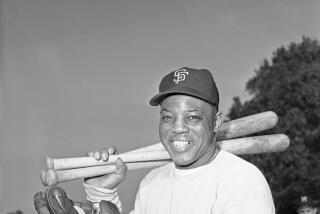Ex-Athlete Struggles to Find His Place in the Real World
- Share via
The Crazy Horse Electric Game by Chris Crutcher (Greenwillow Books: $11.75; 215 pp.)
Willie Weaver is one of those small-town athletes who seem to come along once every generation, who play sports so well that their greatest games seem somehow to spill over from the playing field into the life of their town. Their triumphs are high points in the lives of all the other kids too, and for the older generations are a symbol of the continuity of small-town life--the great athlete of this generation reviving the memory of their own glory days.
In fact, Willie’s glory is a continuation of his father’s, for Big Will was the town’s athlete of his generation, and he has spent thousands of hours teaching Willie to play.
Willie’s greatest game is the state American Legion baseball championship against the Crazy Horse Electric Company team. He pitches a shutout, drives in the only run and makes the final play in a manner that “etches the Crazy Horse Electric game in the mind of every citizen and ballplayer and coach--maybe every dog and cat--in Coho, Mont.”
A few weeks later, a water-skiing accident leaves him partially paralyzed and with a serious speech impediment. Willie survives, but the athlete part of him is dead, the part that was his center and the center of his whole world.
Into the Real World
The rest of the book is the story of Willie’s struggle to find a new center, both physically and emotionally. From his perfect world, the world of his own perfection, he descends into the real world. He runs away from home. He runs away, so he thinks, to escape the pity of others, not realizing that his own self-pity is the heavier burden.
Willie certainly escapes pity. His first encounter away from home takes place outside the bus terminal in Oakland, where a gang of kids ask him, “You a crippled kid?” and, finding out that he is, beat him to a pulp and take his money.
When he runs away, the book becomes equally--and more traditionally--a story of obstacles and overcoming them. The change in emphasis is crucial. It is, in fact, the moral of the story.
The book is compelling at first because of the author’s ability to present convincingly a real family and its problems, but it becomes much more compelling as it embraces some of the more traditional elements of young people’s fiction.
Typical Confrontations
Much of what happens to Willie after he runs away is fairly typical of young adult fiction. He comes into contact with a series of almost stock characters: a pimp, a tough black kid, a wise principal of a school for kids in trouble, an unsentimental but understanding woman physical therapist and the by now almost mandatory martial arts master. Yet Crutcher brings them to life so vividly that they escape being stock--and the book escapes its genre.
The themes of fathers and sons, sports and overcoming disability are interwoven very subtly. Even while mourning the loss of his athletic ability, Willie measures his recovery through sports. It is through sports therapy, pick-up basketball games and tai chi that he regains his center. Yet sports failed Willie’s father, who fails utterly when playing your hardest and doing your best become more complicated in real life than they are in games. In fact, all the fathers in the book have hurt their sons, and one of the obstacles that all the kids at Willie’s school have to overcome is the damage inflicted on them by their families.
In the end, Willie’s family has fragmented, so Willie’s triumph, though real, is still very tentative--the book ends, as it must, on an ambiguous note. Yet the moral remains unambiguous. It is that, just as the baseball game in the beginning was “all his to win or lose,” so, too, life after his accident is still his game to win or lose. Just how hard it is to learn that simple moral is Willie’s story; it makes a terrific book.
More to Read
Sign up for our Book Club newsletter
Get the latest news, events and more from the Los Angeles Times Book Club, and help us get L.A. reading and talking.
You may occasionally receive promotional content from the Los Angeles Times.









